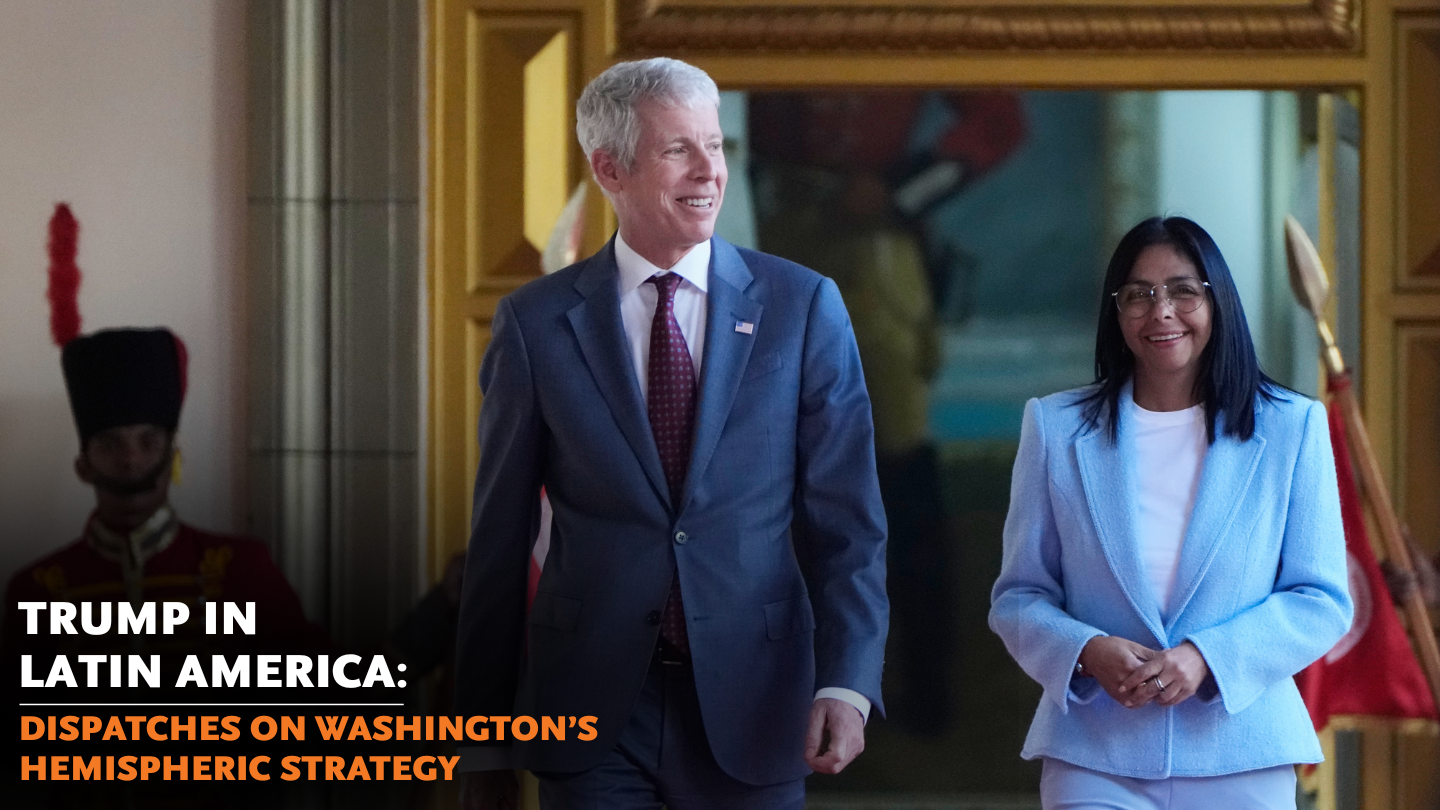COA's Eric Farnsworth on the Delayed U.S.-Colombia TPA Vote
COA's Eric Farnsworth on the Delayed U.S.-Colombia TPA Vote
In an AS/COA Online Interview, COA Vice President and trade policy expert Eric Farnsworth discusses Congress' decision to delay consideration of the U.S.-Colombia free-trade agreement. He warns that a failure to approve the deal would undermine regional allies who support an open market democratic system.
"[I]n some ways the Colombia agreement has been a real victim of the political calendar."
COA Vice President Eric Farnsworth, an expert on trade policy in the Western Hemisphere, speaks with AS/COA Online Managing Editor Carin Zissis about the U.S.-Colombia Trade Promotion Act. Earlier this week, the White House sent the legislation to U.S. Congress to consider the pact within 90 days under fast-track rules. The U.S. House of Representatives responded by approving a house rule to remove the 90-day timeline, leaving the future of the trade deal uncertain. Farnsworth says if the deal comes to a vote before a new U.S. president takes office and after elections that it may meet approval. "If, however, the vote on the bill is postponed until 2009 with the new president—whoever he or she is—it is going to complicate passage quite significantly," he says.
AS/COA: Congress superseded the 90-day limit on fast-track authority on the U.S-Colombia trade pact. Why?
Farnsworth: The action today by Congress was to suspend the timeline under fast-track. The reason why they did that was because the Speaker of the House Nancy Pelosi indicated that in order to bring up and pass a Colombia bill it would require an agreement with the White House on legislation, including trade-adjustment assistance [TAA] and other broad economic adjustment assistance for the United States. She didn’t believe that under the current window established by fast-track legislation that there would be time to pass this other pending legislation. So, this is an effort to suspend the timeline so that other legislation that’s necessary, as she sees it, can be dealt with and then the Colombia agreement can be dealt with within due course.
AS/COA: Before White House passed the Colombia trade legislation on to Congress, there was opposition voiced by Democratic congressional leaders. Why did the White House choose to go ahead?
Farnsworth: There was and is opposition among the Democratic leadership, but it was a never opposition necessarily to the bill itself. It was opposition to the timing. The purpose [of the delay] was to say to the White House: Look, until we, the Democratic leadership and the Democratic Caucus, believe that we’ve addressed some of the broader issues dealing with economic uncertainty in the United States, we don’t believe that it’s timely or appropriate to bring up the Colombia legislation. The White House believed that, in order to get a vote this year under fast-track legislation, they had to submit it on or before 90 legislative days prior to the summer recess. That’s why they chose to move ahead even without agreement by the congressional leadership.
AS/COA: What do you think the vote today means for the future of the trade deal?
Farnsworth: Well, it’s a setback but it doesn’t kill it. What it means is that the agreement itself is still very much alive but the timing is uncertain. If the bill is brought up after the election but before the adjournment of Congress, I believe that it has a decent chance of passing because the politics begin to work a little bit better. If, however, the vote on the bill is postponed until 2009 with the new president—whoever he or she is—it is going to complicate passage quite significantly.
So I think it is uncertain at this point. Clearly, the timeline has been moved back. We’re not going to get a vote as early as we had anticipated we would, whether it makes it more likely or less likely to pass I think very much depends on when the vote itself actually occurs. If it occurs in a lame-duck session I think you can make the case that passage could be quite possible; if it slips to 2009 I think you can make an equally strong case that it would be a significant setback and passage at that point would be very uncertain.
AS/COA: Speaking of 2009, obviously this has coincided with the controversy of Mark Penn resigning and the buildup to the Pennsylvania primaries between Hillary Clinton and Barack Obama. What do you think their campaigning means for the agreement and what it could mean if a Democrat came into power?
Farnsworth: I think that the timing of the agreement is very unfortunate in a couple ways. Number one, most observers have predicted that the Democratic primaries would essentially be over at this point. In other words, the primaries themselves would no longer be contested and there’d be a window of opportunity whereby some of the rhetoric and some of the intensity and emotion of a campaign trail would be reduced, at least until the conventions in August. What we’ve seen is that because the Democratic campaign is so close and every vote really counts, and because labor provides such a significant core—in money and organizing and vote-getting for candidates—both Democratic candidates tack even more toward the anti-trade view. We haven’t just seen it in the case of Colombia, we’ve seen it in South Korea, we’ve seen it in NAFTA, and in all kinds of trade-related activities.
It’s been compounded by the fact that some of the states that remain in play happen to be the old industrial states of the industrial Midwest and the so called Rust Belt, in the Ohios of the world and the Pennsylvanias of the world. Because the ground is being contested in that way, trade takes on a prominence in a manner that it might not in other states. What you’re seeing is that candidates are fighting on this ground and they're fighting for the votes of people who are almost, by definition, anti-trade.
So in some ways the Colombia agreement has been a real victim of the political calendar. What does it mean in terms of going forward into the next administration? Well, obviously it depends on who the Democratic candidate is and who is elected president, but I think you can make the case that if a Democrat is elected president in November that the Democratic leaders of the House will want to see this issue off the plate before the new Democratic president would take office. Therefore, they'd try to move it forward in a lame-duck session so that the new president does not either have to take the blame for trying to get it passed, or have to undermine any sort of new and fresh and vibrant hemispheric policy with the first step of being trying to kill a Colombia trade agreement. So it just gets it off the plate; the new president would be able to protest, say how horrible it is, but in the end move it forward.
If the candidate who is elected is the Republican, I think you can make the opposite case that the Democratic leadership will have no interest in making life easy for the new Republican president and will, quite frankly, not have an incentive to move it forward in a lame-duck session. So it does matter who is elected and the timing matters. All of this is to say that it remains highly uncertain.
AS/COA: You talked a little bit about some of the hemispheric impact. How are some of the leaders around the Western Hemisphere reacting to what’s happening with the Colombia trade deal?
Farnsworth: The leaders that we’ve heard from are literally reacting with shock and awe, in terms of how these issues are playing in Congress. We heard from presidents, ministers, and ambassadors in Washington who have said quite explicitly that to vote down the agreement with Colombia or to take no action on it would be, in the words of the ambassador of Mexico to the United States [Arturo Sarukhan], “the greatest geostrategic blunder that U.S. could make.” Why does he have an interest in weighing in on politically charged issue with a country that’s not even his? The interest is that Mexico, Peru, Colombia, and all the countries of the region—certainly throughout Central America—are facing their own cross-cutting currents and their own battle for the hearts and minds of people and the whole idea of an open market democratic system that’s taken for granted in most of the rest of the world; it’s still an issue of debate in Latin America. So the leaders who believe in this and have organized their societies around it see their own prospects directly undermined if the United States turns its back on one of our closest hemispheric friends.
What it does is it emboldens opponents to the U.S. who've said, "We told you can’t depend on the United States." It causes everybody in the region who is close to the U.S. to question what is the cost-benefit analysis of a close relationship with the United States, and it gives real stature to those such as Ollanta Humala in Peru or AMLO [Andres Manuel Lopez Obrador] in Mexico. This is like throwing gasoline onto the fire. For those who have said, particularly in the policy community and elsewhere, that we’re losing Latin America and we’ve ignored the region and all of this, if they can't stand up for a trade agreement with one of our best friends, then all of that rhetoric rings hollow. I think it is really time to stand up and be counted.








